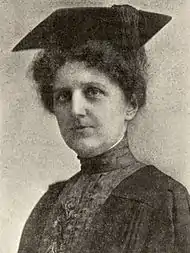Ann Allebach
Ann Jemima Allebach (May 8, 1874 – April 27, 1918) was an American minister, educator and suffragette. She was the first woman ordained as a Mennonite minister in North America,[2][3] on January 15, 1911.[4] There was not another Mennonite woman ordained until 1973.[3]
Ann Allebach | |
|---|---|
 Allebach, c. 1916 | |
| Born | Ann Jemima Allebach May 8, 1874 |
| Died | April 27, 1918 (aged 43) |
| Occupation | Mennonite minister |
| Political party | Progressive Party[1] |
Allebach was the first woman ever chosen from Kings County, New York, to be a delegate to a national political convention. She was chosen for the 1912 Republican National Convention held in Chicago but was not allowed to attend. She was a delegate from the Eighteenth Assembly District of the State Convention of the Progressive Party at Syracuse.[1]
Early life and education
Ann Jemima Allebach was born on May 8, 1874[2] in Montgomery County, Pennsylvania, and grew up near Schwenksville.[4] Her parents were Sarah Markley Allebach and Jacob R. Allebach, who was a banker and postmaster.[2] As a child, she founded a chapter of Young People's Society of Christian Endeavour in her hometown.[2] In 1893, she became a principal of a school in East Orange, New Jersey, and began her college studies.[2] She studied at Ursinus College, New York University, Columbia University, and Union Theological Seminary.[4]
Career
Following her studies, she taught at Perkiomen Seminary in Pennsburg, Pennsylvania.[4]
Ordination
She requested ordination from the minister of her home church and a minister in Philadelphia.[2] They agreed to her request,[2] though the culture in that part of Pennsylvania would remain generally opposed to women ministers for several decades.[3] She was ordained on 15 January 1911 at the First Mennonite Church in Philadelphia.[2] Following her ordination, she returned to New York City, living in Brooklyn.[4]
In June 1913 she said:—[1]
I foresee and foretell the time when, under good citizenship in the right sense and equality, an Americanized continent shall contemplate and inspire an Americanized world. Not a world or continents under single or similar control, but with governments moralized and spiritualized with the principles of liberty, equality, justice and opportunity regulated by righteous law, inspired by a righteous people, loving right, hating evil, helping the weak and restoring humanity to the plane of human brotherhood and sisterhood whereon it shall walk hand in hand with the Divine Fatherhood.
— Rev. Ann Allebach
Right to preach and suffrage
After returning to New York City, she spoke out about women's right to preach, and was also outspoken in supporting women's right to vote.[4] In Brooklyn, she preached at the Marcy Avenue Baptist Church from 1913–1915.[5] She also ministered to the poor, and was asked by the Mayor of New York to organize a conference on home religion and social services.[2] She was frequently invited back to Pennsylvania to preach.[2] In 1916, she was called to be the minister for the Sunnyside Reformed Church on Long Island.[2]
Death and legacy
On April 27, 1918, she died of a heart attack.[2] She was the first ordained female Mennonite minister in North America.[2][3][4]
References
Citations
- "True Spirit of the Ballot is Humanitarian". The Brooklyn Daily Eagle. New York. June 8, 1913. p. 15 – via Newspapers.com.

- Fretz 1990.
- Skinner Keller 2006, p. 268.
- The Reading Eagle 1911, p. 14.
- "Miss Allebach to Preach". The Brooklyn Daily Eagle. New York. January 15, 1916. p. 9 – via Newspapers.com.

Bibliography
- Fretz, J. Herbert (1990). "Allebach, Ann Jemima (1874–1918)". Global Anabaptist Mennonite Encyclopedia Online. Retrieved 5 Dec 2015.CS1 maint: ref=harv (link)
- Skinner Keller, Rosemary; Radford Ruether, Rosemary; Cantlon, Marie (2006). "Women of Anabaptist Traditions". Encyclopedia of Women and Religion in North America: Women and religion: methods of study and reflection. 1. Indiana University Press. ISBN 0-253-34685-1.
- "Rev. Ann J. Allebach, Known in Berks, Speaks of Work". The Reading Eagle. Reading, Pennsylvania. December 20, 1911. Retrieved December 5, 2015.